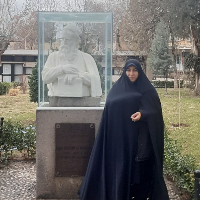Evaluating Bokhari’s Historical Narratives about the Holy Prophet’s Life in the Realm of Fiqh (Jurisprudence) and Belief before and after Prophecy
Islamic heritage reflects the teachings of the Holy Prophet Mohammad in biography (Syrah) and narrative books. One of the most prominent Sunni narrative references which reflected the holy prophet's teachings is Bokhari's Sahih (translation: credible). Bokhari has attributed a considerable number of narrations regarding Fiqh and faith to the Holy Prophet in this book. Hence, the goal of this study is to evaluate Bokhari's narrations about Islamic beliefs and Fiqh in this book. The importance and necessity of such a study increase considering the credibility of Bokhari's Sahih amongst the Sunnis as the most credible and reliable book after the Quran. This study examines Bokhari's historiography considering the deeds and actions he attributed to the holy prophet regarding Islamic Fiqh and Faith through library research and the descriptive-analytical method. Based on the findings, the narrators and the implications of Bukhari's hadiths and the predicates presented therein, their conflicts with other predicates recited by him, other historical reports, Quran, and other widely accepted beliefs of the Muslims bring his historiography into question. We demonstrated our evaluation by examining Bukhari's Fiqh and faith narrations containing notions such as the holy prophet deeming idles sacred before his prophecy, doubting his prophecy, learning about the Judgment day's events from the Jews, being influenced by the Jews in fasting in the Ashoora day (10th of Moharram), and not observing the Islamic rulings and laws.
According to the Holy Quran, God has set his Prophet an excellent role model, so Islamic scholars have tried to record narrative predicates about the teachings of the Holy Prophet (peace be upon him). One of the most prominent narration references of the Sunnis that has recorded the Holy Prophet's teachings is Sahih (of) Bukhari. Since there are so many interactions in the realm of Beliefs and Fiqh attributed to the Holy Prophet (peace be upon him) by Bukhari in this book, this study aims to assess and evaluate his narrations about Islamic beliefs and Fiqh as recorded and reported in this book, based on the methodological criticism of historiography. This issue is of paramount importance considering the position of Sahih Bukhari amongst Sunnis as the most reliable and credible book after the Holy Quran since it is one of the oldest inclusive narration books (a.k.a. Jawami) of Sunnis and one of their primary references. The vast number of narrations recorded and the inclusiveness of the subjects make this even more paramount. None of the studies done on the subject of Sahih Bukhari have ever criticized Bukhari's historiography or reviewed the narrations attributed to the Holy Prophet (peace be upon him) using a historical method.
Using the library research approach and descriptive analysis, this study tries to assess and evaluate the quality of Bukhari's historiography considering the actions and interactions he has attributed to the Holy Prophet (peace be upon him) regarding the realm of Islamic beliefs and Fiqh. The present study evaluates ten samples chosen from historical predicates mentioned in Sahih Bukhari, projecting an overall image of his historiography. Discussion of Results and
This study concludes that Bukhari's approach is narrative historiography, one of the oldest and most prominent manners for recording history. Bukhari has mentioned various narrations regarding historical events and news using this method. There are different reasons to believe that Bukhari has chosen his narrations and narrators selectively and biased and has presented a false picture of the Holy Prophet's (peace be upon him) beliefs and Fiqh teachings. The findings of this study regarding the contents of Sahih Bukhari show that the book focused on the subjects of beliefs, Fiqh, history, ethics, and interpretation (of the Holy Quran), and Bukhari has narrated parts of the Holy Prophet's (peace be upon him) sayings using the ascribing method. In this study, the faith narrations are about the Holy Prophet's (peace be upon him) activities before his Prophecy when facing idles and afterward regarding His Prophecy and when facing the Jews. Eventually, Bukhari's performance regarding the belief narrations focused on his reports about the pre-prophecy period of Prophet Muhammad's (peace be upon him) life, the beginning of his Prophecy, and during it. Bukhari attributes admiring idles and offering sacrifices for them before prophecy to his Holiness. The portion of Sahih is dedicated to the pre-prophecy period and the beginning of the prophecy is relatively modest. Narrations mainly focused on the description and interpretation of the Prophet's teachings during his Prophecy, the inclusiveness of which in the realm of beliefs and Fiqh is abundantly clear. Based on the narrations mentioned by Bukhari, we could point to predicates such as Jews influencing his Holiness and their command over his Holiness, the Jews bewitching his Holiness, and his holiness' admitting that prophets before him were superior to him. The findings of this study about authenticity show that some narrators of historical reports in Sahih Bukhari were related to Jewish scholars and their reported narrations. In some cases, the nature of the relationships persuaded them to recite Ka’b al-Ahbar's sayings instead of those of the Holy Prophet’s (peace be upon him). One of those narrators reported even ‘Isra'iliyyat’ and was well known for it. As for content, there are some discrepancies between reports of Bukhari and those of other historical narrations or other historical events. Some of the historical predicates presented by Bukhari are in conflict with the Holy Quran or even common sense, all of which take the author to believe that Bukhari’s account of the Holy Prophet’s (peace be upon him) beliefs and Fiqh issues is incorrect.
- حق عضویت دریافتی صرف حمایت از نشریات عضو و نگهداری، تکمیل و توسعه مگیران میشود.
- پرداخت حق اشتراک و دانلود مقالات اجازه بازنشر آن در سایر رسانههای چاپی و دیجیتال را به کاربر نمیدهد.


